- News
- Student Voice: PANOZACHOU Konstantinos
Student Voice: PANOZACHOU Konstantinos
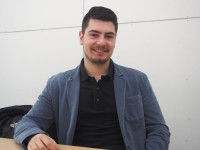
- Posted
- Fri, 01 May 2015
From Hellenic Republic (Greece)
- Name
PANOZACHOU Konstantinos - Country/ Region of Citizenship
Hellenic Republic (Greece) - Graduated from
Aristotle University of Thessaloniki - Department
Department of Civil and Environmental Engineering (Master’s)
How did you find out about Waseda University?
I have been a MEXT student until recently for 2 years, so when I was applying for universities 2 years ago, I found Waseda and read about it after a friend of mine had suggested that I should search for Waseda.
Why did you choose Waseda University?
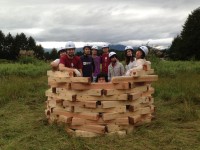 I had my friend’s recommendation and also found out on your website that the faculties you have here in engineering, also include the one I wanted to study. When I contacted Waseda, I was amazed by their fast response, and by how kind and helpful with all the procedures. I also applied for several universities in Tokyo, but they answered too slow and were not helpful. So, all the reasons came together. I had already made up my mind for Waseda even after the other Universities contacted me.
I had my friend’s recommendation and also found out on your website that the faculties you have here in engineering, also include the one I wanted to study. When I contacted Waseda, I was amazed by their fast response, and by how kind and helpful with all the procedures. I also applied for several universities in Tokyo, but they answered too slow and were not helpful. So, all the reasons came together. I had already made up my mind for Waseda even after the other Universities contacted me.
How did you get information for our program?
I basically read about the English program on the website. When I came here, I was in the department of Architecture, and I was planning to get into the Japanese-based program. However I didn’t have the JLPT N2 because my Japanese was not good enough at that moment. So, I stayed in the architecture school for 2 more years because I liked it, and then I decided to move to the English-based program in the department of Civil and Environmental Engineering.
Did you have any concerns before coming to Japan?
I had no concerns or second thoughts. I really wanted to come here and had made up my mind about 2 years before I come to Japan. I even started learning Japanese with that goal in mind.
The ones who had concerns were my parents. They were (mostly) worried about the radiation, and if it is safe to live here in general, but in the end they let me free to make my own choices. Actually my mother came to visit me last year, and she got so relieved with the safety, the society and peaceful atmosphere in Japan that now they are totally fine with me being here.
In my school, I had a project, and I had to compare the European planning system with the Japanese one. I really got very fascinated about the Japanese planning system and how you manage things and everything is in order. When I thought about where I should go for my master’s, I knew I had to go to Japan. And then, I started learning Japanese.
Have you had any difficulties when you started a new life here?
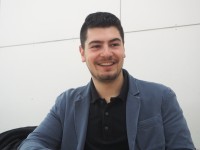 The greatest difficulty was communication, because my Japanese level was not enough when I arrived here. I experienced some difficulties with bureaucracy and the paperwork, like the residence card etc. These things are always kind of difficult, but now I am used to it. I can fill out those forms easily and even write my address in Japanese really fast. This is actually the only thing I can write fast in Japanese, because I’ve written it so many times.Finding a place to live could have been difficult but was relatively easy for me. I had the help of a friend of mine from my previous lab. He called some real estate agents and made the arrangements. When I actually visited the agents, I could talk in person in Japanese, so it was ok. It only took about a week to find an apartment with the help of my friend. It was pretty fast compared to other people. They search for apartments for 2 to 3 weeks.I actually love Japanese food. The first 2 months I was here, I lost 5 kg because Japanese food is very healthy. It is really different from Greek food. We use a lot of olive oil and eat bread every day. Japanese food is cleaner and lighter, I think. I had no problem switching to Japanese diet.
The greatest difficulty was communication, because my Japanese level was not enough when I arrived here. I experienced some difficulties with bureaucracy and the paperwork, like the residence card etc. These things are always kind of difficult, but now I am used to it. I can fill out those forms easily and even write my address in Japanese really fast. This is actually the only thing I can write fast in Japanese, because I’ve written it so many times.Finding a place to live could have been difficult but was relatively easy for me. I had the help of a friend of mine from my previous lab. He called some real estate agents and made the arrangements. When I actually visited the agents, I could talk in person in Japanese, so it was ok. It only took about a week to find an apartment with the help of my friend. It was pretty fast compared to other people. They search for apartments for 2 to 3 weeks.I actually love Japanese food. The first 2 months I was here, I lost 5 kg because Japanese food is very healthy. It is really different from Greek food. We use a lot of olive oil and eat bread every day. Japanese food is cleaner and lighter, I think. I had no problem switching to Japanese diet.
How is your life in Japan and Waseda?
Since my master’s course started, I could say I am quite busy. Also, I do not have a scholarship like I had before, so I started a part-time job and this takes up a lot of my time as well. So, it is quite busy but I like it. I like having things to do every day. I don’t like sitting around and do nothing. As for my part-time job, I teach English and Greek to Japanese students. They found me through a site where you can sign up as a teacher.
Whenever I have worries or problems, I always ask people and learn how to solve them. So, I don’t worry. I try to see the positive side of things. I usually go directly to my professor if there is a problem concerning my classes or thesis. But if it is about administrative things, I go the office. All the people there are very helpful.
As for my personal life, in these 2 years, I have made many Japanese and foreign friends who are ready to help me if I have a problem. I met my best friends at the cafeteria, gym, and lab. There are many places even inside school where you can socialize and meet good people.
What do you do in your free time?
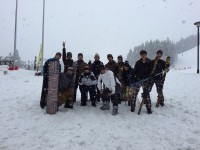 I usually try to be as Greek as I can and take Sundays off, because Sundays for Greek people are sacred. It is a rest day, no matter what. So I try to have my Sundays off, or even maybe sometimes Saturdays as well, except for the times I have to come to the lab. But usually I am quite free on weekends. I like going out for food with my friends and exploring new places in Tokyo. Tokyo is such a vast city that 2 years are not enough to explore everything. So occasionally, a friend of mine takes me to a place I have never been before, and I get really amazed. It is a totally new experience. I like Shimo-Kitazawa and Shibuya a lot. I like the differences between these two places. So many different places in the same city. If I speak like a planner, first of all, the street sizes and building proportions are totally different. In Shimo-Kitazawa, you have small sized, buildings and neighborhood-like atmosphere with many second-hand shops and small cafes where you can drink your coffee outside. In Shibuya, you have to go up to lets say the fifteenth floor of a building for the same activities. I also like Iidabashi for the beautiful riverside. There you can see tall buildings combined with nature, as the river running between them. I always try to observe the places I go both as a tourist and as a planner. I also like going to the gym, trying to keep both mind and body healthy. I like playing video games, especially the strategy and role-playing ones. Japan is very good at making these kind of games. I try to cook every day. I bring my own bento (home-packed meal) with some meat and vegetables and buy some salad, juice, and onigiri (rice balls) from Seikyo (University Co-op Shop). With my food, I usually like to eat Feta cheese but it is kind of expensive here so l had my parents bring some when they came for a visit, and I also brought some when I came back from Greece in summer.
I usually try to be as Greek as I can and take Sundays off, because Sundays for Greek people are sacred. It is a rest day, no matter what. So I try to have my Sundays off, or even maybe sometimes Saturdays as well, except for the times I have to come to the lab. But usually I am quite free on weekends. I like going out for food with my friends and exploring new places in Tokyo. Tokyo is such a vast city that 2 years are not enough to explore everything. So occasionally, a friend of mine takes me to a place I have never been before, and I get really amazed. It is a totally new experience. I like Shimo-Kitazawa and Shibuya a lot. I like the differences between these two places. So many different places in the same city. If I speak like a planner, first of all, the street sizes and building proportions are totally different. In Shimo-Kitazawa, you have small sized, buildings and neighborhood-like atmosphere with many second-hand shops and small cafes where you can drink your coffee outside. In Shibuya, you have to go up to lets say the fifteenth floor of a building for the same activities. I also like Iidabashi for the beautiful riverside. There you can see tall buildings combined with nature, as the river running between them. I always try to observe the places I go both as a tourist and as a planner. I also like going to the gym, trying to keep both mind and body healthy. I like playing video games, especially the strategy and role-playing ones. Japan is very good at making these kind of games. I try to cook every day. I bring my own bento (home-packed meal) with some meat and vegetables and buy some salad, juice, and onigiri (rice balls) from Seikyo (University Co-op Shop). With my food, I usually like to eat Feta cheese but it is kind of expensive here so l had my parents bring some when they came for a visit, and I also brought some when I came back from Greece in summer.
How are the relationships with your supervisor and lab members?
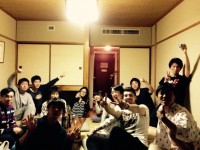 I had the opportunity to have an experience with 2 supervisors so far. My supervisors are both very good people and give to their labs a friendly atmosphere, but I would say that they are quite different. One is older and has many years of experience. The other one is younger and spends a lot of time with us. He is always around. My previous supervisor left the best impressions to me, and the current one is already one of my favorite people in Japan. He is very nice.I love my lab members. They are all very cool people. Maybe it’s an engineering thing to be a very good person, but all the people I’ve met in engineering schools so far, are very nice people. I still see my previous lab members and go out for drinks or dinner with them. With my current lab members, I have spent a lot of time together already and even went out for many nomikai (drinking party). They are mostly Japanese, but I like the fact that they want to speak English too. So when we are with the other international students who do not speak Japanese, we also speak in English.
I had the opportunity to have an experience with 2 supervisors so far. My supervisors are both very good people and give to their labs a friendly atmosphere, but I would say that they are quite different. One is older and has many years of experience. The other one is younger and spends a lot of time with us. He is always around. My previous supervisor left the best impressions to me, and the current one is already one of my favorite people in Japan. He is very nice.I love my lab members. They are all very cool people. Maybe it’s an engineering thing to be a very good person, but all the people I’ve met in engineering schools so far, are very nice people. I still see my previous lab members and go out for drinks or dinner with them. With my current lab members, I have spent a lot of time together already and even went out for many nomikai (drinking party). They are mostly Japanese, but I like the fact that they want to speak English too. So when we are with the other international students who do not speak Japanese, we also speak in English.
Outline of the research
The population in cities all around the world keeps increasing by the day, and it is estimated that the greatest part of our planet’s population will be living in urban areas in the a few decades. Of course the increasing population in the urban areas keeps adding pressure on their system, threatening their sustainability and resilience. Two of the most trending strategies of the past decades in defending the urban sustainability are the “Compact City” and the “Sustainable Urban Mobility” (SUM) strategies.
My research will focus on understanding the effects of the Compact City and Sustainable Urban Mobility (SUM) planning on urban resiliency. In other words, aim to find out if the prevention of city’s expansion by raising the population density, mixing the land uses, and providing better transportation system, can also create a sustainable community and a safer city to live in. So the main question of my research to be answered would be:
Compact city=Resilient City=Sustainable city? And how can we create this triple equality?
In order to achieve my research goal and answer the above question I will examine both Greek and Japanese cities that are clamed to have developed or are developing under the compact city principals, in search for good or bad practices, evaluating the current resiliency and sustainability levels as well as the potential for enhancement through transportation and land use planning.
Even though Japanese proficiency is not required in this English-based program, you are fluent in Japanese. Is there anything special you did to really improve your Japanese?
I had studied Japanese before I come here but my Japanese was not good enough at that time. So I really tried in the first year to learn Japanese as much as I could. I was participating in the lab meetings and trying to present my research in Japanese. I was taking Japanese lessons only the first 6 months at Waseda, but then I thought I learned better through life, through my everyday communication with other people. So I usually learn from friends everyday phrases and informal way of speaking, and then I go to the lab meetings and see the formal way of speaking and presenting. These experiences become very useful later. I started taking notes every time I go to the meetings and sometimes I interrupt the professor and ask the meaning of words or phrases he just used. It is good that he does not mind me interrupting him and he likes the fact that I want to learn. He is always happy to explain. His English is very good so he can explain very clearly.
I have only been in the current lab for a short time, and the presentations I have done so far are in English because we have other international students, but I am hoping to present my final thesis in Japanese in the end.
What is your career goal after your degree completion?
If we had done this interview like 4 days ago, I would have said I would like to start working in Japan for some years or maybe go to Europe. However, right now I am not sure if I want to go straight to job hunting or continue for a PhD, because my relationship with my professor is going really well and I like my research. If I can find a scholarship to cover my expenses, I am considering continuing to the doctoral course.
Short message to the prospective students
in English
Hey everyone!
If you are reading this message, you are probably considering coming to Japan and Waseda University to study. I am going to be honest with you as I always try to be with people. Life in Japan is not easy if you’re planning to come here as a regular, full time student. There are difficulties and obstacles in both your University and every day life that many times will have to overcome. But let me tell you what, it’s TOTALLY worth it! I think that the good experiences, the knowledge and the memories that you will acquire totally beat the difficulties that you will face. The culture, the food, the people, the transportation system (my favorite aspect of Tokyo) and so many more aspects of Japan are simply amazing and quite different from your country (especially if you come from Greece).
As for Waseda University, I think that wouldn’t have been able to overcome many of the above-mentioned difficulties if it wasn’t for this University and the people I have met here. Waseda is great place to study, but most importantly it is a big multicultural community that welcomes people from all over the world, an aspect that not many Japanese universities have.
in Greek
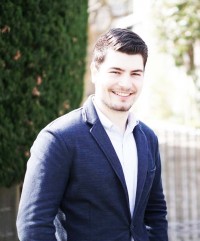 Γεια σας!Εάν διαβάζετε αυτό το μήνυμα, μάλλον σημαίνει πως σκέφτεστε ή σχεδιάζετε να έρθετε στην Ιαπωνία για να συνεχίσετε τις σπουδές σας. Θα προσπαθήσω να είμαι ειλικρινής με αυτά που θα γράψω στη συνέχεια ώστε να αποκτίσετε όσο το δυνατόν καλύτερη εικόνα. Η ζωή στην Ιαπωνία δεν είναι εύκολη εάν σκοπεύετε να έρθετε εδω για να κάνετε το Μάστερ και ακόμα πιο δύσκολη εάν πρόκειται για Διδακτορικό. Εκτός από τα πανεπιστημιακά ζητήματα, οι δυσκολίες που θα συναντήσετε στην καθημερινή σας ζωή είναι αρκετές και διάφορες (π.χ. απίστευτη γραφειοκρατία). Παρόλα αυτά, πιστεύω πως αξίζει τον κόπο 100%. Όλες οι εμπειρίες, οι γνώσεις και οι αναμνήσεις που θα μπορέσετε να αποκτήσετε κατά τη διάρκεια της διαμονής σας εδώ, αντισταθμίζουν τις δυσκολίες που θα συναντήσετε. Η κουλτούρα, οι άνθρωποι, το φαγητό, οι μεταφορές (προσωπικό αγαπημένο) είναι όλα θαυμάσια και τόσο διαφορετικά από την χώρα μας που δεν πρόκειται να βαρεθείτε, ενώ πάντα θα υπάρχει κάτι διαφορετικό να ζήσετε.Όσο για το πανεπιστήμιο Γουσέντα, μπορώ να πω πως αν δε είχα την βοήθεια των ανθρώπων εδώ (προσωπικό του πανεπιστημίου, και φίλων) δεν θα είχα καταφέρει να ξεπεράσω κάποιες από τις δυσκολίες που ανέφερα παραπάνω. Το Γουασέντα είναι ένα πολύ καλό πανεπιστήμιο (θα το καταλάβετε με το που δείτε τις εγκαστάσεις του), αλλά ταυτόχρονα και μια πολυ-πολιτισμική κοινότητα που θα σας δώσει την ευκαιρία να γνωρίσετε ανθρώπους από όλα τα μέρη της γης, χαρακτηριστικό που άλλα ιαπωνικά πανεπιστήμια δεν κατέχουν.
Γεια σας!Εάν διαβάζετε αυτό το μήνυμα, μάλλον σημαίνει πως σκέφτεστε ή σχεδιάζετε να έρθετε στην Ιαπωνία για να συνεχίσετε τις σπουδές σας. Θα προσπαθήσω να είμαι ειλικρινής με αυτά που θα γράψω στη συνέχεια ώστε να αποκτίσετε όσο το δυνατόν καλύτερη εικόνα. Η ζωή στην Ιαπωνία δεν είναι εύκολη εάν σκοπεύετε να έρθετε εδω για να κάνετε το Μάστερ και ακόμα πιο δύσκολη εάν πρόκειται για Διδακτορικό. Εκτός από τα πανεπιστημιακά ζητήματα, οι δυσκολίες που θα συναντήσετε στην καθημερινή σας ζωή είναι αρκετές και διάφορες (π.χ. απίστευτη γραφειοκρατία). Παρόλα αυτά, πιστεύω πως αξίζει τον κόπο 100%. Όλες οι εμπειρίες, οι γνώσεις και οι αναμνήσεις που θα μπορέσετε να αποκτήσετε κατά τη διάρκεια της διαμονής σας εδώ, αντισταθμίζουν τις δυσκολίες που θα συναντήσετε. Η κουλτούρα, οι άνθρωποι, το φαγητό, οι μεταφορές (προσωπικό αγαπημένο) είναι όλα θαυμάσια και τόσο διαφορετικά από την χώρα μας που δεν πρόκειται να βαρεθείτε, ενώ πάντα θα υπάρχει κάτι διαφορετικό να ζήσετε.Όσο για το πανεπιστήμιο Γουσέντα, μπορώ να πω πως αν δε είχα την βοήθεια των ανθρώπων εδώ (προσωπικό του πανεπιστημίου, και φίλων) δεν θα είχα καταφέρει να ξεπεράσω κάποιες από τις δυσκολίες που ανέφερα παραπάνω. Το Γουασέντα είναι ένα πολύ καλό πανεπιστήμιο (θα το καταλάβετε με το που δείτε τις εγκαστάσεις του), αλλά ταυτόχρονα και μια πολυ-πολιτισμική κοινότητα που θα σας δώσει την ευκαιρία να γνωρίσετε ανθρώπους από όλα τα μέρη της γης, χαρακτηριστικό που άλλα ιαπωνικά πανεπιστήμια δεν κατέχουν.
- Tags
- General Student Voices






